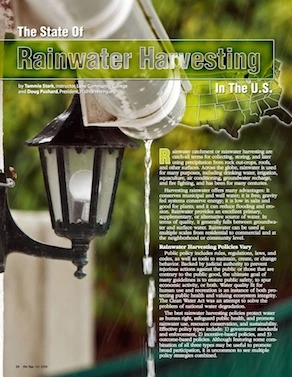
Rainwater catchment or rainwater harvesting are catch-all terms for collecting, storing, and later using precipitation from rock out-crops, roofs, and other surfaces. Across the globe, rainwater is used for many purposes, including drinking water, irrigation, aquaculture, air conditioning, groundwater recharge, and fire fighting, and has been for many centuries. Harvesting rainwater offers many advantages: It conserves municipal and well water; it is free; gravity fed systems conserve energy; it is low in salts and good for plants; and it can reduce flooding and erosion. Rainwater provides an excellent primary, supplementary, or alternative source of water. In terms of quality, it generally falls between groundwater and surface water. Rainwater can be used at multiple scales from residential to commercial and at the neighborhood or community level.
Keywords: rainwater harvesting, policy, codes, public, conservation

